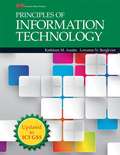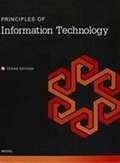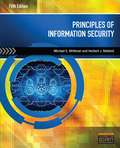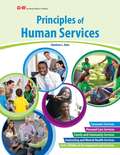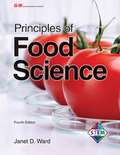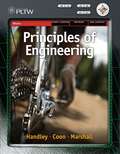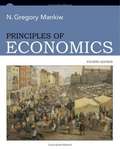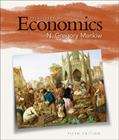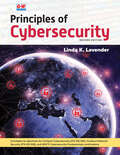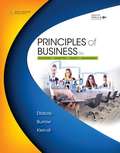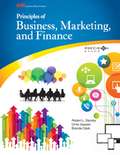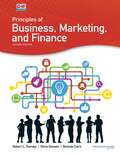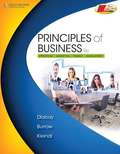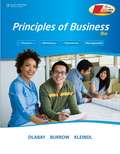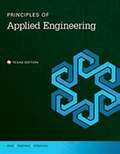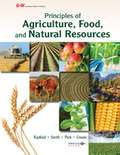- Table View
- List View
Principles of Information Technology
by Kathleen M. Austin Lorraine N. BergkvistPrinciples of Information Technology presents basic principles and concepts about information technology to help students become more valuable employees, better citizens, and knowledgeable consumers. Written specifically for high school students, this text maps to the IC3 Digital Literacy Certification standards. By studying this text, students can prepare for taking the Certiport IC3 Digital Literacy Certification exams. IC3 Digital Literacy Certification is a well-respected and internationally recognized credential.
Principles of Information Technology: Preparing for IC3 Certification
by Suzanne WeixelNIMAC-sourced textbook
Principles of Information Security
by Michael E. Whitman Herbert J. MattordSpecifically oriented to the needs of information systems students, PRINCIPLES OF INFORMATION SECURITY, 5e delivers the latest technology and developments from the field. Taking a managerial approach, this bestseller teaches all the aspects of information security-not just the technical control perspective. It provides a broad review of the entire field of information security, background on many related elements, and enough detail to facilitate understanding of the topic. It covers the terminology of the field, the history of the discipline, and an overview of how to manage an information security program. Current and relevant, the fifth edition includes the latest practices, fresh examples, updated material on technical security controls, emerging legislative issues, new coverage of digital forensics, and hands-on application of ethical issues in IS security. It is the ultimate resource for future business decision-makers.
Principles of Food Science
by Janet D. Ward Larry T. Ward Jodi Songer RiedelThis book demonstrates how the laws of science are at work in producing, processing, preparing, preserving, and metabolizing food. Students learn how cooking, health, and storage tips connect science basics to daily food encounters. The text covers the basic laws of chemistry, microbiology, and physics as they relate to food components and complex food systems. Students learn scientific facts and principles that they can apply to a future food science career and to more-creative, nutritious home cooking. The requirements and opportunities for obtaining a food science career are explored as well as the impact of this career path on local, national, and global economies. You also learn how cooking, health, and storage tips connect science basics to daily food encounters.
Principles of Floral Design: An Illustrated Guide
by Pat Diehl Scace James M. DelPrinceNIMAC-sourced textbook
Principles of Floral Design: An Illustrated Guide
by Pat Diehl Scace James M. DelPrincePrinciples of Floral Design introduces the theory and hands-on skills required to begin a career as a floral designer. This beautiful, heavily-illustrated textbook features over 1200 color images, including flowers, foliage, dried materials, and potted plants, to engage students and help with identification. The text begins by introducing the floriculture industry and careers, the history of floriculture, and design principles and elements. The textbook then presents the various types of products used in floral designs, before progressing into common floral applications and events. 75 Step-by-Step Procedures, featuring new illustrations, in-depth instructions, lists of materials needed, and alternate floral materials, help new instructors and students learn proper design. Twenty new Career Connections feature interviews of professionals from all areas of the industry who share their professional journeys and offer advice to students entering the profession. The text is designed to be used in both floral design and agriculture programs, and the student projects at the end of each chapter provide ideas for SAEs.
Principles of Engineering
by Brett A. Handley David M. Marshall Craig CoonPRINCIPLES OF ENGINEERING will help readers better understand the engineering concepts, mathematics, and scientific principles that form the foundation of the Project Lead the Way (PLTW) Principles Of Engineering course. Important concepts and processes are explained throughout using full-color photographs and illustrations. Appropriate for high school students, the mathematics covered includes algebra and trigonometry. Strong pedagogical features to aid comprehension include: Case Studies, boxed articles such as Fun Facts and Points of Interest, Your Turn activities, suggestions for Off-Road Exploration, connections to STEM concepts, Career Profiles, Design Briefs, and example pages from Engineers' Notebooks. Each chapter concludes with questions designed to test the reader's knowledge of information presented in the chapter, along with a hands-on challenge or exercise that compliments the content and lends itself to exploration. Key vocabulary terms are highlighted throughout the book and emphasized in margin definitions.
Principles of Economics (Fourth Edition)
by N. Gregory MankiwPRINCIPLES OF ECONOMICS continues to be the most popular and widely used text in the Economics classroom. The 4th edition features a strong revision of content in all 36 chapters while maintaining the clear and accessible writing style that is the hallmark of the highly respected author. The 4th edition also features an expanded instructor's resource package designed to assist instructors in course planning and classroom presentation and full integration of content with Aplia, the leading online Economics education program. In the 4th edition Greg Mankiw has created a full educational program for students and instructors -- Experience Mankiw 4e. "I have tried to put myself in the position of someone seeing economics for the first time. My goal is to emphasize the material that students should and do find interesting about the study of the economy. " - N. Gregory Mankiw.
Principles of Economics (3rd edition)
by N. Gregory MankiwDesigned for a two-semester introductory course in economics, this textbook covers micro- and macro-economics. After dealing with the basic tools of supply and demand, Mankiw looks at government intervention in market allocations, firm and industrial organization behavior, labor markets, the behavior of the real economy over the long run, and the macroeconomics of open economies, and short run fluctuations within long run trends. Similarly to many textbooks on economics and many other subjects, there is little acknowledgment of controversy within the field.
Principles of Economics
by N. Gregory MankiwPRINCIPLES OF ECONOMICS continues to be the most popular and widely used text in economics classrooms today. The fifth edition features a strong revision of content in all 36 chapters while maintaining the clear, accessible writing style and precise presentation that are the hallmark of this highly respected author. Dozens of new applications emphasize the real-world relevance of economics for today's students through interesting news articles, realistic case studies, and engaging problems. The new edition also features an expanded instructor's resource package designed to assist in course planning and classroom presentation, as well as full integration of content with Aplia. "I have tried to put myself in the position of someone seeing economics for the first time. My goal is to emphasize the material that students should and do find interesting about the study of the economy. "--N. Gregory Mankiw.
Principles of Cybersecurity
by Linda K. LavenderThis foundational textbook prepares students for industry-recognized cybersecurity certification including Certiport Information Technology Specialist Cybersecurity, Certiport Information Technology Specialist Network Security, Cisco Certified Support Technician Cybersecurity, and NOCTI Cybersecurity Fundamentals. The certification-driven text is designed with effective pedagogical elements by highlighting certification objectives, essential questions, key terms, and learning goals. Formative and summative assessments are features in every chapter to foster critical-thinking, research, and communication skills.
Principles of Business, Precision Exams Edition
by Les Dlabay James Burrow Brad KleindlNIMAC-sourced textbook
Principles of Business, Marketing, and Finance
by Robert L. Dansby Chris Gassen Brenda ClarkNIMAC-sourced textbook
Principles of Business, Marketing, and Finance
by Robert L. Dansby Chris Gassen Brenda ClarkPrinciples of Business, Marketing, and Finance is a contemporary text that presents the business concepts that are vitally important in today’s workplace. The basics of business, marketing, and finance are introduced in an easy-to-understand manner that helps students connect the concepts to their everyday life. By studying this text, students will learn the basic principles of commerce, which can help them become valuable employees and responsible citizens. Personal finance information is also presented to help students become knowledgeable consumers and financially literate individuals.
Principles of Business, Marketing, and Finance
by Robert L. Dansby Chris M. Gassen Brenda ClarkPrinciples of Business, Marketing, and Finance offers pedagogical tools and hands-on activities that prepare students to become knowledgeable consumers, digital citizens, and successful employees or entrepreneurs, as they maximize their knowledge of business concepts. The basics of business, marketing, and finance―as well as personal finance and career management―are introduced in an easy-to-understand manner that helps students apply math, English Language Arts, technology, and soft skills to plan for a future career. The second edition has been updated to reflect recent changes in tax laws and procedures, and includes new coverage of workplace diversity and safety, understanding FAFSA for education and personal financial planning, and management challenges such as insider trading and legal procedures.
Principles of Business
by Les R. Dlabay James L. Burrow Brad A. KleindlPRINCIPLES OF BUSINESS, Ninth Edition, provides complete instruction in business concepts and skills students need in today's competitive environment. This market-leading introductory business text offers extensive coverage in major business concepts, such as finance, marketing, operations, and management. Students gain valuable information and skills for the workplace, as well as preparation for success in competitive events, such as DECA, FBLA, and BPA.
Principles of Business
by Les R. Dlabay James L. Burrow Brad A. KleindlPRINCIPLES OF BUSINESS, Eighth Edition, prepares students for the real world of business with complete coverage of finance, marketing, operations, and management.
Principles of Arts, Audio/Video Technology, and Communications
by Emergent LearningNIMAC-sourced textbook
Principles of Applied Engineering
by Kenneth Reid David Reeping Elizabeth A. StephanNIMAC-sourced textbook
Principles of Agriculture, Food, and Natural Resources: Applied Agriscience
by John S. Rayfield Kasee L. Smith Travis D. ParkNIMAC-sourced textbook
Principles of Agriculture, Food, and Natural Resources: Applied Agriscience
by John S. Rayfield Kasee L. Smith Travis D. Park D. Barry CroomThis comprehensive new text welcomes today’s learners to the diverse and exciting world of agriscience and prepares them for more advanced courses. Written by leaders in agriculture education, Principles of Agriculture, Food, and Natural Resources provides a fresh, visual, and highly applied introduction to the systems and concepts that define modern agriculture, including food systems and natural resources. Reading and critical thinking skills are developed by several features in each lesson, including “Before You Read,” “Analyze and Apply,” and “Thinking Critically.” All of these challenge learners to research topics in depth and to apply what they have learned.
